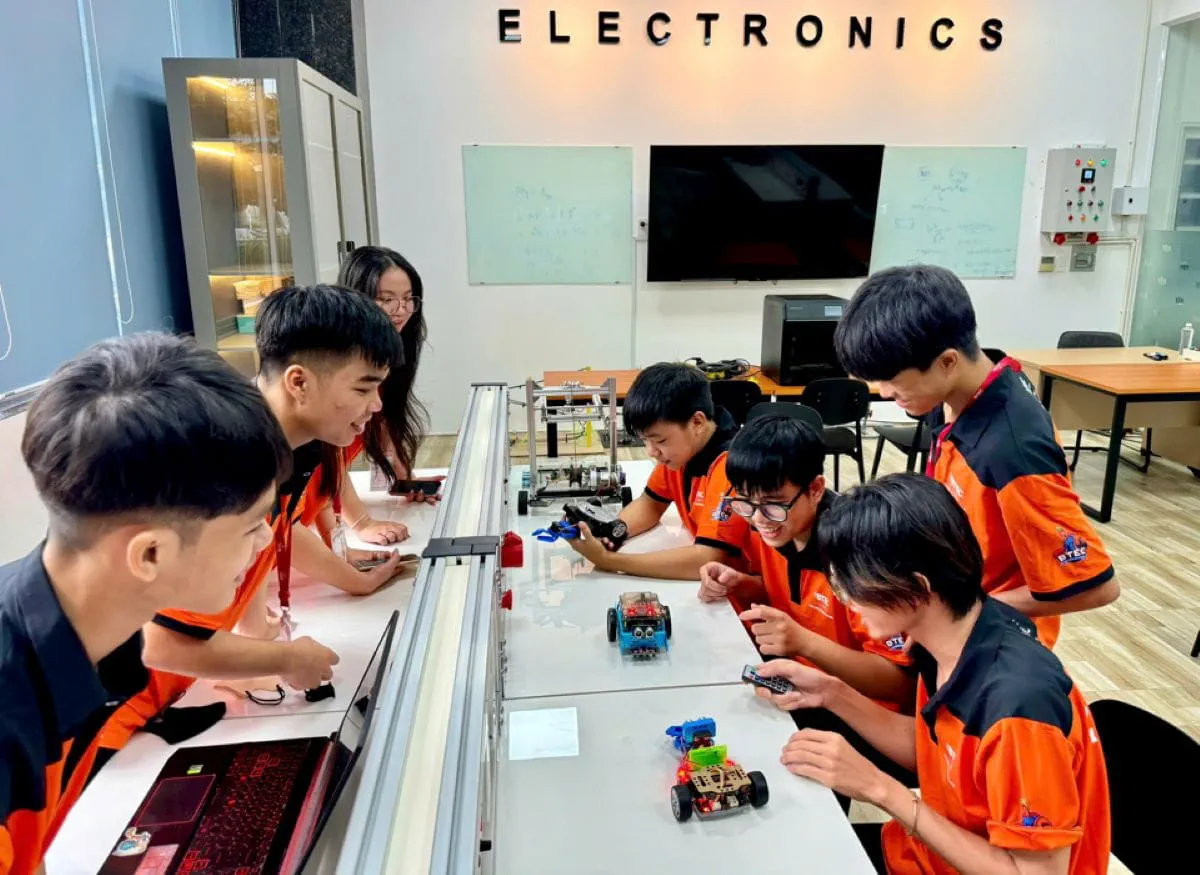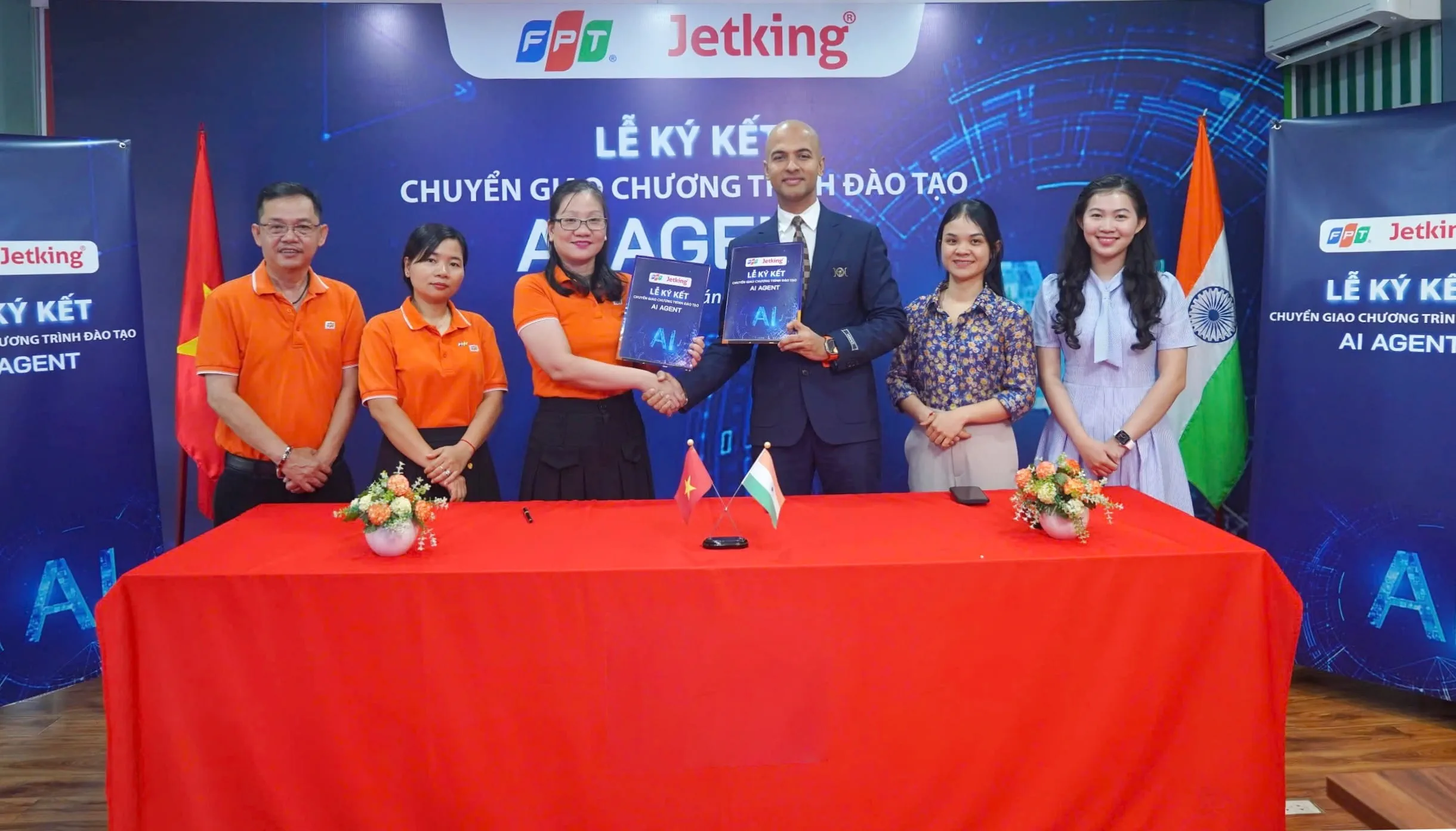Semiconductor: A 'Career for the Future'
•
16/10/2024
Given the projection that Vietnam will require 50,000 skilled professionals in the semiconductor industry by 2030, several vocational training institutions have teamed up with international universities to adopt and transfer undergraduate-to-graduate-level training programs in this field.
Educational institutions leading the trend
The push to train human resources in Vietnam's semiconductor industry has gained traction in recent years. Still, it's set to take off in 2024 as the country becomes a magnet for major global investors. According to the national strategy, by 2030, Vietnam aims to produce at least 50,000 university graduates to support the industry.
To address this growing demand, numerous universities have hit the ground running since 2023, launching initiatives to prepare the workforce. For the 2024 enrollment season, over ten universities nationwide have introduced majors in the Chip Design and Semiconductor Industry. Additionally, vocational training institutions like FPT Polytechnic College and Hanoi Industrial Vocational College are stepping up and equipping themselves with the right programs, resources, and equipment to train skilled personnel in semiconductor technology.
Mr. Vu Hai Long, Director of the International College Center at FPT Polytechnic College, noted that FPT is fully committed to advancing the Semiconductor industry. In 2024, FPT Polytechnic received approval from the General Department of Vocational Education under the Ministry of Labor, Invalids, and Social Affairs to enroll and train 350 students at the college level in Semiconductor Technology, and they've already met that target.

Hands-on training class for students majoring in Semiconductor Technology at FPT Polytechnic. Photo: BTEC FPT
FPT Polytechnic’s Semiconductor Technology training program meets international standards, having been developed in collaboration with Pearson Education Organization from the UK. The program spans two years.
Mr. Do Quoc Binh, Head of the IT Department at FPT Polytechnic, explained that the curriculum is structured with a balanced mix of 50% theory and 50% hands-on practice. Although it's a college program, it's designed with a pathway for students to transfer to university, resulting in a slightly heavier emphasis on theoretical content than typical college programs.
Graduates from the Semiconductor Technology program can seamlessly continue their studies at international universities that recognize the standards set by Pearson. These students can enter university directly in their third year, bypassing the first two years since they've already covered many foundational theoretical subjects at the college level.
Students can continue their studies in Semiconductor Technology at FPT University, at international universities within Vietnam, or at foreign institutions that recognize the training program. Alternatively, graduates can jump straight into the workforce in roles related to chip packaging and testing.
"FPT University is committed to providing students with opportunities to study and work in the semiconductor field in advanced countries and regions like Japan, South Korea, and Taiwan (China). To support this initiative, the university has established numerous cooperation agreements with international partners, enabling graduates to gain valuable experience and knowledge abroad. This hands-on experience allows them to return to Vietnam well-equipped to contribute to the country", Mr. Vu Hai Long added.
Workforce preparedness
Hanoi Industrial Vocational College (HNIVC) is taking a proactive approach to training human resources for the Semiconductor Technology industry by integrating specialized semiconductor modules into its Mechatronics and Electrical-Electronic Engineering programs. This initiative equips students with knowledge of printed circuit design and the PCB semiconductor manufacturing process, ensuring they are well-prepared to meet job demands upon graduation.
In addition to launching the Semiconductor Technology major, HNIVC has been proactive in enhancing its faculty's expertise by sending lecturers to short-term training sessions on chip design, where they have successfully earned certifications. To support its Semiconductor Technology training, the college has also mobilized resources from industry partners.
By August 2024, HNIVC leaders signed a cooperation agreement with TLB Vina Co., Ltd., a leading Korean company specializing in microchip manufacturing.
Under this agreement, TLB Vina will provide HNIVC lecturers with textbooks and materials on printed circuit boards (PCB) manufacturing stages, enhancing educational quality and ensuring the training program aligns with real-world production practices.
TLB Vina Co., Ltd. is looking to recruit hundreds of practical engineers to support its monthly production of up to 30,000m² of PCB. The company has committed to hiring graduates from HNIVC's Semiconductor training program, offering salaries between 15 to 30 million VND per month, depending on the candidate's skills and experience.
HNIVC has partnered with Lunghwa University of Science and Technology (Taiwan) for Semiconductor Technology training. In the 2024 academic year, the college plans to enroll 70 students in Electrical and Electronic Engineering Technology and 26 in the Semiconductor program at Longhua University.
Mr. Phan Van Vuong, Deputy Head of the Faculty of Electrical and Electronic Engineering at HNIVC, stated that students will receive 2.5 years of foundational training in Semiconductor studies. Upon graduation, they will have the opportunity to study Semiconductor Technology at the university level at Longhua University. They will be guaranteed jobs at Taiwanese corporations for at least two years, with a monthly salary of 30,000 NTD.
After two years, graduates can choose to stay and work long-term or return to Vietnam for positions in Taiwanese chip design companies. Salaries vary based on job roles and skills, with chip design positions earning between 40 to 50 million VND per month, while packaging and production roles offer 20 to 30 million VND per month.
Despite the high demand for Semiconductor Technology personnel with competitive salaries, many colleges lack a dedicated job code for this field. To address this gap, institutions are forming partnerships with foreign universities for training in Semiconductor Technology.
To support the national strategy of training 50,000 human resources for the Semiconductor Industry, colleges are urging the Ministry of Labor, Invalids and Social Affairs and the General Department of Vocational Education to establish a Semiconductor Technology job code. They also call on local governments to invest in training equipment, especially for testing.
It will enable vocational training institutions to launch specialized programs, enroll students, and effectively train the workforce needed.
The Semiconductor Technology industry has specific requirements for learners. To succeed in this field, individuals need strong logical thinking skills and a genuine passion for technical subjects. English proficiency is also essential, with a minimum IELTS score of 5.5 being necessary, according to Mr.Vu Hai Long, Director of the International College Center at FPT Polytechnic.




